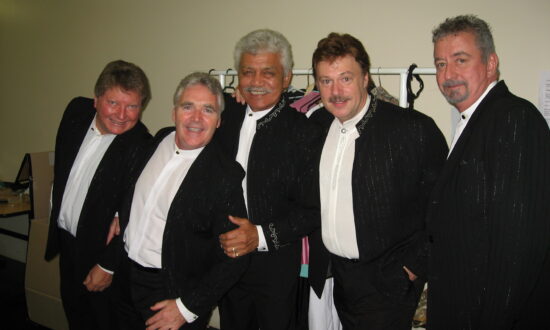There are some deeply troubling aspects of Benjamin Britten’s The Turn of the Screw. They hover uncomfortably over the work, and we need to confront them for two reasons. One is that even at the time he considered writing an opera based on the Henry James novella of the same name, friends advised him against going ahead with the idea, saying that the subject was toxic. Second, the themes that Britten presents of inappropriate sexual attraction involving children are highly confronting, even downright repugnant, in the year 2022.
Surely, one might say, here is a case for reinterpreting The Turn of the Screw in a thoroughly modern way that preserves its music but rids any sordid content. Such things have been done many times before, after all, in the interests of political correctness – one thinks of banishing black make-up in Aïda or bullfighting in Carmen, for example.

Figures – including Kanen Breen as Quint – appear and disappear into the shadows. Photo: Soda Street Productions
But not so in Stuart Maunder’s latest production for State Opera, in which he gives us Britten’s last chamber opera in all its unreformed glory. It makes one squirm. The sexual attraction Peter Quint has for the young boy Miles is totally undisguised. “He liked them pretty, and he had his will morning and night,” observes Mrs Grose, the long-time housekeeper at Bly manor where all the Gothic horror unfolds.
More challenging, though, is Miles himself. To begin with, he is the picture of innocence, playing chasey in the house with his sister Flora and doing his homework. Gradually, however, his tone changes. The Latin homework he is doing turns out to be a string of obscenities in Latin. “To the masculine are assigned: amnis, axis, caulis, collis, clunis, crinis, fascis, follis, fustis…” he sings – and if I tell you it is filth you won’t need to look them up.
Taking control of the new governess who has been hired to look after the siblings, and communing with the ghosts of Quint and the former governess, Miss Jessel, Miles announces to her with a defiant smile: “You see, I am bad… aren’t I?”
By interval the opera sits right on the precipice, but worse is to come. Plagued by visions of these ghosts and not knowing if anyone else is seeing them, the governess’s mind falls to pieces until the final moment when Miles blurts out: “Peter Quint – you devil!”. At which point, and seemingly out of relief, she kisses the boy fiercely and passionately on the mouth and he falls lifeless to the ground.
Bewildered by the obscenities that pile up in this opera, one leaves the theatre punch-drunk, not knowing how to make sense of it. And this is exactly as Britten intended, surely. These days it takes courage to run the gauntlet with the politically correct brigade and stay artistically true to what, in this instance, is one of the most provocative and enthralling operas ever written. But that is what Maunder has done in a wonderfully executed production of genuine psychological intensity.
Subtly lit figures appear and disappear into the shadows behind enormously tall wooden walls that represent the manor house. The look is forbidding but intriguing, much like Britten’s score, which works powerfully on one’s imagination through an ominous patter of percussion and oddly shaped, dissonant melodies that rise up in viola, cello and celesta.
Paul Kildea, standing in at very late notice for an indisposed Anthony Hunt, directs a tight 13-piece ensemble from the Adelaide Symphony Orchestra with a great feeling for how thought and sound intimately fuse together in Britten’s distinctive musical language. It was as if this beautiful but strangely menacing music was infecting one’s mind – again, no doubt, what he was after.

Kanen Breen (Quint), Rachelle Durkin (the governess) and Max Junge (Miles) in The Turn of the Screw. Photo: Soda Street Productions
The cast in this production are the pick of what is available in Australia, and are ideally matched. Rachelle Durkin takes on the role of the governess with huge conviction, arriving with beaming anticipation at the lonely manor house like Mary Poppins (minus the umbrella) but crumbling mentally as things take a sinister turn.
Kanen Breen is just priceless as Peter Quint. Singing a demonic coloratura as he sidles up to Miles and pulling faces like a gargoyle, he alternately taunts and seduces his victim in what adds up to an unbelievably riveting performance. If anyone in the world can do a better Quint, I’d like to know.
Fiona McArdle is wonderfully weird as the other ghoulish apparition, Miss Jessel; and thanks to Max Junge and Eliza Brill Reed, the two child roles of Miles and Fiona are carried off with a far greater degree of vocal and acting accomplishment than one could ever rightfully expect from two 12-year-olds.

Get InReview in your inbox – free each Saturday. Local arts and culture – covered.
Thanks for signing up to the InReview newsletter.
All the characters seem mad in their various ways, and in the end it is the sober-minded but otherwise dull Mrs Grose whom we must hang onto for our own sanity. Taken with resolution and fortitude by Elizabeth Campbell, she is our only rock of stability.
Costumes and lighting are also brilliantly done, making this State Opera effort right up there on par with a Glyndebourne production. Maunder and team have cooked up a real beauty.
State Opera South Australia is presenting The Turn of the Screw at the Festival Theatre again on May 4 and 6.
Support local arts journalism
Your support will help us continue the important work of InReview in publishing free professional journalism that celebrates, interrogates and amplifies arts and culture in South Australia.
Donate Here




